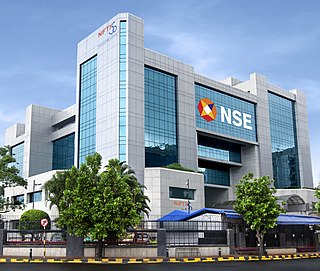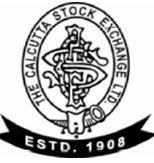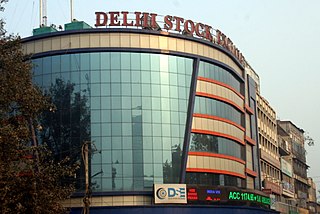Related Research Articles

A stock market, equity market, or share market is the aggregation of buyers and sellers of stocks, which represent ownership claims on businesses; these may include securities listed on a public stock exchange as well as stock that is only traded privately, such as shares of private companies that are sold to investors through equity crowdfunding platforms. Investments are usually made with an investment strategy in mind.

The Securities and Exchange Board of India (SEBI) is the regulatory body for securities and commodity market in India under the administrative domain of Ministry of Finance within the Government of India. It was established on 12 April 1988 as an executive body and was given statutory powers on 30 January 1992 through the SEBI Act, 1992.

BSE Limited, also known as the Bombay Stock Exchange (BSE), is an Indian stock exchange which is located on Dalal Street. Established with the efforts of cotton merchant Premchand Roychand in 1875, it is the oldest stock exchange in Asia, and also the tenth oldest in the world. The BSE is the world's 6th largest stock exchange with a market capitalization exceeding US$5 trillion on May 21, 2024.

National Stock Exchange of India Limited (NSE) is one of the leading stock exchanges in India, based in Mumbai. NSE is under the ownership of various financial institutions such as banks and insurance companies. It is the world's largest derivatives exchange by number of contracts traded and the third largest in cash equities by number of trades for the calendar year 2022. It is the 7th largest stock exchange in the world by total market capitalization, exceeding $5 trillion on May 23, 2024. NSE's flagship index, the NIFTY 50, is a 50 stock index that is used extensively by investors in India and around the world as a barometer of the Indian capital market. The NIFTY 50 index was launched in 1996 by NSE.
Ketan Parekh is a former stockbroker from Mumbai, who was convicted in 2008 for involvement in the Indian stock market manipulation scam that occurred from late 1998 to 2001. During this period, Parekh artificially rigged prices of certain chosen securities, using large sums of money borrowed from banks including the Madhavpura Mercantile Co-operative Bank, of which he himself was a director.
The Madras Stock Exchange (MSE) was a stock exchange in Chennai, India. The now defunct MSE was the fourth stock exchange to be established in the country and the first in South India. It had a turnover (2001) of ₹ 3,090 crore, but was a fraction of the turnover generated by the Bombay Stock Exchange and National Stock Exchange of India. The turnover of the stock exchange was 19,907 Crore as of the financial year 2012.
Ludhiana Stock Exchange (LSE) is a defunct stock exchange that was fully owned by Government of India. It was established in the year 1983. By 1999-2000, the exchange had a total of 285brokers, out of which 79 were corporate brokers. Among 284 brokers, it was further classified as 212 proprietor broker, 2 partnership broker and 70 corporate broker. Then, there was only 2 sub-brokers registered.

Inter-connected Stock Exchange Ltd. (ISE) is an Indian national-level stock exchange. under the ownership of Ministry of Finance, Government of India. It is responsible for providing trading, clearing, settlement, risk management and surveillance support to its trading members. It started its operation in 1998 in Vashi, Mumbai, and has 841 trading members, who are located in 18 cities. These intermediaries are administratively supported through the regional offices at Delhi, Kolkata, Patna, Ahmedabad, Coimbatore and Nagpur, besides Mumbai.

Calcutta Stock Exchange (CSE) is an Indian stock exchange based in Kolkata, India. It is owned by Ministry of Finance, Government of India. It is one of oldest stock exchanges in Asia and third largest bourse in India. It was founded in May 1908 at 2, China Bazar Street.
Cochin Stock Exchange was an Indian stock exchange in Kochi, Kerala fully owned by Government of India. It was incorporated in 1978. At its peak, it had almost 500 Indian companies listed, and with a daily turnover of ₹70–₹100 crore, it was the fourth largest exchange in India.
Madhya Pradesh Stock Exchange (MPSE) was a stock exchange located at Indore, Madhya Pradesh, India. It was a SEBI recognized Permanent Stock Exchange, until its de-recognition in 2015. Established in 1919, it was 3rd oldest stock exchange in India, and a leading stock exchange under outcry system.
Hyderabad Stock Exchange (HSE) was a stock exchange established in 1941 located in Hyderabad, India. The exchange was disbanded in 2007 by SEBI and since January 2013, HSE was conditionally permitted to function as regular broking or corporate entity.
Bhubaneswar Stock Exchange (BhSE) was a stock exchange located in Bhubaneswar, Odisha, India. It was incorporated on 17 April 1989, and granted recognition to the Stock Exchange on 5 June 1989, by the Ministry of Finance, Govt. of India. It is one among the 21-odd regional stock exchanges in India.

Delhi Stock Exchange (DSE) was a stock exchange located in New Delhi.
Guwahati Stock Exchange (GSE) was a stock exchange located in Gauhati, Assam.
Commodity trading in India has a long history. In fact, commodity trading in India started much before it started in many other countries. However, years of foreign rule, droughts and periods of scarcity and government policies caused the commodity trading in India to diminish.

Motilal Oswal Financial Services Limited is an Indian financial services company offering a range of financial products and services. The company was founded by Motilal Oswal and Raamdeo Agrawal in 1987.
IIFL Finance Limited d/b/a IIFL and India Infoline Finance Limited, is an Indian diversified financial services company headquartered in Mumbai. The organisation was founded by Nirmal Jain. IIFL and its group companies are backed by Canadian investor Prem Watsa, private equity firm General Atlantic and CDC Group, the UK Government's private equity arm. IIFL is ranked among the top seven financial conglomerates in India and as the top independent financial services firm in India in terms of market capitalisation. Nirmal Jain is the chairman of the group, while R Venkataraman is the group managing director and co-promoter.
Angel One Limited, formerly known as Angel Broking Limited, is an Indian stockbroker firm established in 1996. The company is a member of the Bombay Stock Exchange, National Stock Exchange of India, National Commodity & Derivatives Exchange Limited and Multi Commodity Exchange of India Limited. It is a depository participant with Central Depository Services Limited (CDSL).
The NSE co-location scam relates to the market manipulation at the National Stock Exchange of India, India's leading stock exchange. Allegedly select players obtained market price information ahead of the rest of the market, enabling them to front run the rest of the market, possibly breaching the NSE's purpose of demutualisation exchange governance and its robust transparency-based mechanism. The alleged connivance of insiders by rigging NSE's algo-trading and use of co-located servers ensured substantial profits to a set of brokers. This widespread market fraud came to light when markets' regulator, the Securities and Exchange Board of India (SEBI), received the first anonymous complaint through a whistle-blower's letter in January 2015. The whistle-blower alleged that trading members were able to capitalise on advance knowledge by colluding with some exchange officials. The overall default amount through NSE's high-frequency trading (HFT) is estimated to be ₹500 billion over five years.
References
- ↑ "History of stock exchanges, Introduction, Calcutta Stock Exchange, Delhi Stock Exchange, India". Appuonline.com. 31 December 1946. Archived from the original on 14 June 2009. Retrieved 15 June 2012.
- ↑ "Archived copy". Archived from the original on 21 September 2010. Retrieved 27 September 2013.
{{cite web}}: CS1 maint: archived copy as title (link) - ↑ "Securities and Exchange Board of India - Print Page". Sebi.gov.in. Retrieved 18 September 2016.
- ↑ "Magadh stock exchange begins trading on NSE". Financialexpress.com. 18 August 2000. Archived from the original on 7 February 2011. Retrieved 15 June 2012.